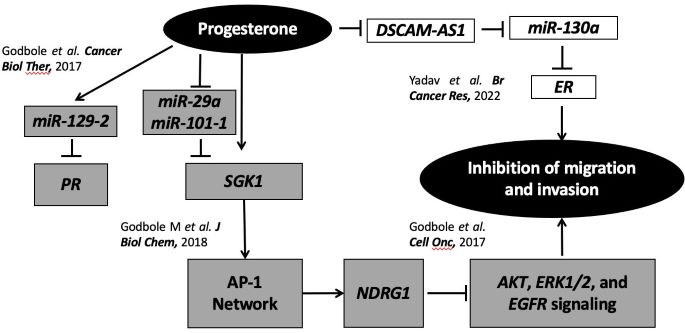
Progesterone modulates the DSCAM-AS1/miR-130a/ESR1 axis to suppress cell invasion and migration in breast cancer.
Yadav N, Sunder R, Desai S, Dharavath B, Chandrani P, Godbole M, Dutt A
Operable breast cancer (OBC) surgery performed among premenopausal have a better outcome if carried out in the luteal rather than the proliferative phase of the menstrual cycle (1). In a randomized clinical trial on OBC patients, a single dose of progesterone--the dominant hormone during the luteal phase -- administered before surgery to mimic the luteal (progestogenic) phase-- showed an increased period of disease-free survival in patients (2), suggesting a protective action of progesterone in breast cancer. Of several hypothesis-generating results from this trial, the survival benefit to breast cancer patients raised an important question about how progesterone affects the outcome?
To understand the molecular basis of this phenomenon, we performed a differential analysis of whole transcriptome dataset for non-coding RNAs in 30 breast cancer patients and tumor cell lines treated with hydroxy progesterone. We identify down-regulation of a long non-coding RNA, Down Syndrome Cell Adhesion Molecule (DSCAM-AS1), upon progesterone treatment in hormone receptor-positive breast cancer cells. The DSCAM-AS1 sponges the activity of a miRNA, miR-130a that targets the 3’-UTR region of the estrogen receptor gene (ESR1) impeding breast cancer cell invasion and migration similar to progesterone treatment. Additionally, we show that breast cancer patients with high expression of miR-130a or low expression of DSCAM-AS1 correlate with better survival outcomes similar to progesterone treatment. Taken together, our study is the first lead to describe the progesterone-responsive long non-coding RNAs and their mechanical functional insight involving the DSCAM-AS1/miR-130a/ESR1 genomic axis downstream to progesterone to impede breast cancer cell invasion and migration. The findings highlight the molecular basis of progesterone treatment, under adjuvant or neoadjuvant settings, in improving survival outcomes in patients with breast cancer.
1. Badwe, R. A., Gregory, W. M., Chaudary, M. A., Richards, M. A., Bentley, A. E., Rubens, R. D., and Fentiman, I. S. (1991) Timing of surgery during menstrual cycle and survival of premenopausal women with operable breast cancer. Lancet 337, 1261-1264.
2. Badwe, R., Hawaldar, R., Parmar, V., Nadkarni, M., Shet, T., Desai, S., Gupta, S., Jalali, R., Vanmali, V., Dikshit, R., and Mittra, I. (2011) Single-injection depot progesterone before surgery and survival in women with operable breast cancer: a randomized controlled trial. Journal of clinical oncology : official journal of the American Society of Clinical Oncology 29, 2845-2851
